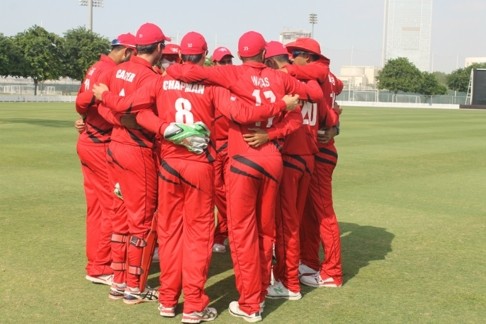
Hong Kong cricket chief Tim Cutler hopes to win new converts as team play first ever first-class matches on home soil
Young executive talks a good game as he outlines his vision to boost profile of sport still seen as a mystery by many in the city
After a few minutes in Tim Cutler’s company it’s easy to see how the Australian, just 33, beat more than 100 applicants to become the Hong Kong Cricket Association’s first chief executive last April.
His passion for the sport – the left-arm spinner for Hong Kong Cricket Club still has not given up hope of playing for Hong Kong when he becomes eligible in 2017 – is evident, and his sales pitch for its future is convincing.
Hong Kong cricket has had a couple of hugely successful years: they won full one-day international (ODI) status until 2018, almost qualified for the 2015 World Cup and beat Bangladesh in their first appearance at the World T20.

An opportunity to raise the profile comes this month, with the first first-class and ODI matches ever on local soil, as Hong Kong take on Scotland.
I think we play a brand different to any nation in the world just because of the nature of HK cricket ... we’ve got that mix of subcontintental flair, with European academies where a lot of the guys have gone to school

“I think we play a brand different to any nation in the world just because of the nature of HK cricket ... we’ve got that mix of subcontintental flair, with European academies where a lot of the guys have gone to school ... Even if of Indian or Pakistani background they may have gone to school like [talented teenager] Anshuman Rath, who is at Harrow, who has the natural flair but with the western coaching – we have something unique.
“That, along with the brand strength of the Hong Kong Sixes and how well we’re going in the World Cricket League and Intercontinental Cup – we’ve got something potentially special here.”
Cutler has two main goals: more players and more grounds. The two are linked, as lack of facilities is essentially capping the number of players who can take part.
New grounds should hopefully be in place relatively soon, with a former landfill site at Gin Drinker’s Bay, the former velodrome site in Ma On Shan, and another ex-landfill project in the works. Cutler is also pitching to consultants KPMG and government officials about the benefits a stadium suited to cricket at the Kai Tak Multi-sports Complex could deliver.
Great catch from Babar Hayat at practice this morning! #HongKongCricket pic.twitter.com/4nYRM3e3bN
— HKCricketAssociation (@CricketHK) January 13, 2016
His team are out in schools trying to convince local kids – and sceptical parents – of the fun and benefits of playing cricket. The opportunity to boost Hong Kong’s often neglected – even abused – communities from the Indian subcontinent has also not been lost.
I think Hong Kong’s not only crying out for something unifying but that gives it a collective identity and we know what sport can do in that regard
“I think Hong Kong’s not only crying out for something unifying but that gives it a collective identity and we know what sport can do in that regard,” he says, pointing to the football team’s recent success.
“Hong Kong struggles in not having sport ingrained in it like many of us from other countries have growing up, but I think listening to CY Leung and other government officials they recognise the importance of sport for personal and community development – so it’s a matter of helping cricket to be the tool that helps along that way.
“We’re already talking to the Jockey Club Charities Commission about potential projects there to help integrate those communities [from the subcontinent] into greater Hong Kong, while at the same time teaching the Chinese community about the sport, which I think would really appeal, it being such a cerebral sport.”
The HKCA have four full-time staff doing courses with local schools and are about to launch a programme around the sixes concept that Cutler hopes will especially appeal.
“Without speaking for [director of cricket] Charlie [Burke], we’re really taking the less-is-more approach rather than a blanket, scattergun way. If we do it right in the number of schools we can control, then there’s more demand and we can scale from that success. We’ve got to maintain that level of service to the schools, teachers, kids to give them the best experience possible.”
Part of the problem is the drain of talent as teenagers head to secondary school or university abroad. One of Hong Kong’s best players, Mark Chapman, has a Chinese mother and would ideally be a poster-boy for local kids, but is already catching the eye of New Zealand as he studies and plays in Auckland.
Cutler says he’s had “really, really positive talks” with KPMG and government agencies responsible for Kai Tak, and his sales pitch for a cricket-focused design for the secondary stadium is intriguing, with visions of ODIs between India and Pakistan and even hosting a Big Bash or Indian Premier League franchise.
For now those remain dreams, with the matches against Scotland the first test of the local appetite for first-class cricket. With public access free, Cutler is hoping for a sizable turnout, though he admits it’s a step into the unknown.
“Early on I was really sure I wanted to be playing these games in Hong Kong,” he adds. “Guangzhou has a stadium pretty much ready-made [built for the Asian Games], but that’s not Hong Kong.
“China have a team, and Hong Kong have a team here – and if we want to build the game we have to build it in Hong Kong.”

